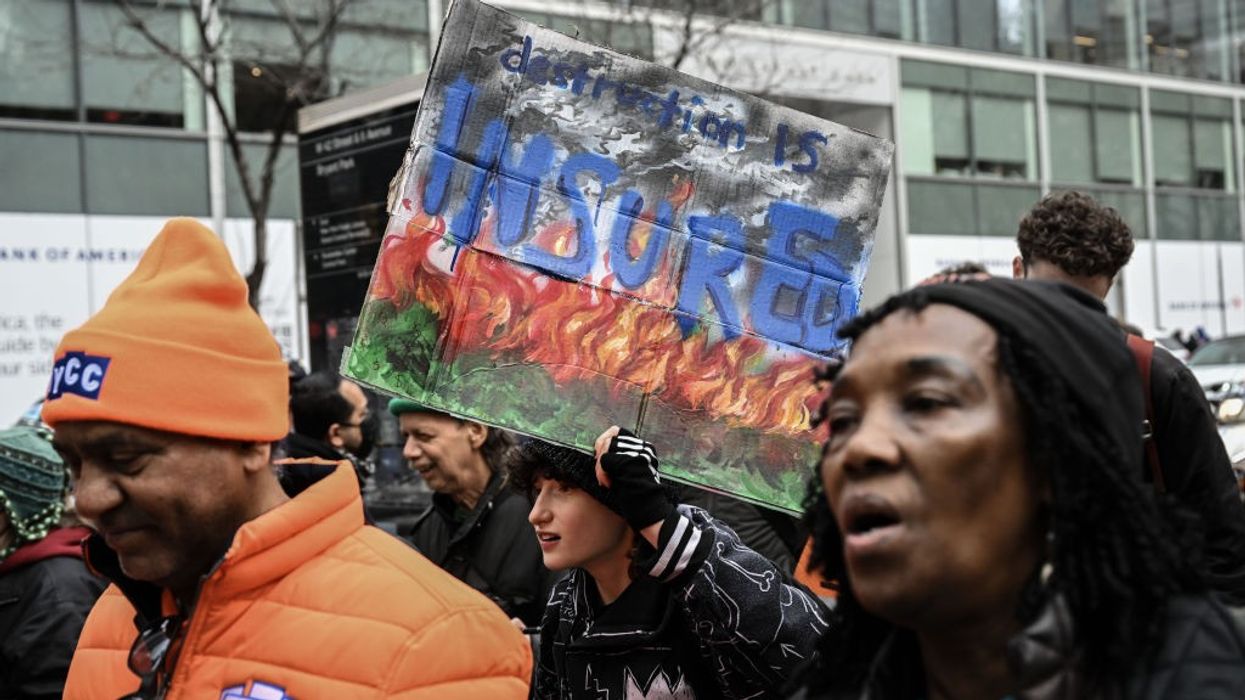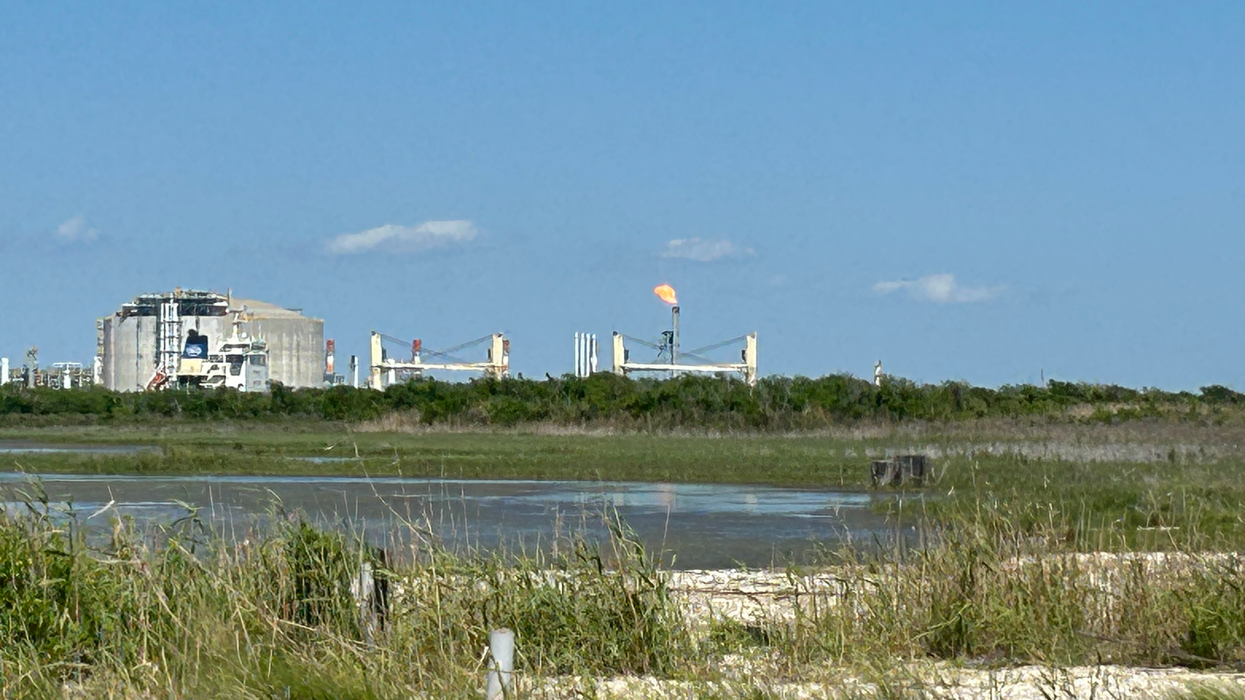Yet Gulf Coast campaigners, who are used to dealing with a lax regulatory environment at the state level, were not defeated.
"Anybody who reports here in Louisiana regularly understands that we've never been protected by our regulatory environment. Never," Anne Rolfes, who directs the Louisiana Bucket Brigade, told reporters. "And so we always have had to take matters into our own hands, and we have protected ourselves against enormous companies."
Misadventure Global
One key strategy that the Louisiana Bucket Brigade and others have used to get around the regulatory rubber stamping of bad actors is to raise public awareness of how the companies turning coastal Louisiana into a sacrifice zone really operate.
Case in point is Venture Global. Rolfe and John Allaire—a 40-year veteran of the oil and gas industry who lives next door to the Calcasieu Pass terminal—laid out its short but extensive record of environmental violations and unethical business practices.
Even before the original Calcasieu Pass began exporting, in January 2022, it had to clear a space for tankers to access the facility.
"It's understood that this is a volatile fuel to lock into, that you don't want to rely on a fuel that Vladimir Putin and Donald Trump control."
"They pumped hundreds of thousands of cubic yards of black viscous sludge from their marine berth out into the front of the Gulf of Mexico," Allaire said. "And that was the first indication of what was to come with Venture Global."
Since it began operating, the company has added air, noise, and light pollution to the water pollution that has devastated local fisheries.
Allaire has taken hundreds of videos and photos of flaring incidents.
"The light pollution is unbelievable," he said. "At night, I can literally read a book when the flares are going, and I'm over a mile away from their flare stacks."
Allaire's observations are backed up by the official record. In June 2023, the Louisiana Department of Environmental Quality sent Venture Global a compliance order detailing over 2,000 air permit violations from its first 10 months of operation, Allaire said. The company has yet to resolve the complaint, and the state sent them a warning letter in March covering their 2024 and 2025 rule-breaking.
The company also has a history of failing to report its flares and other excess emissions to the Department of Environmental Quality as required by the Clean Air Act.
If they reported and then investigated their violations, "that would enable them to really understand what's happening at their facility so that they could prevent future problems," Rolfe said. "They absolutely aren't doing that."
In March, the Louisiana Bucket Brigade and the Habitat Recovery Project notified Venture Global of intent to sue the company over Clean Air Act violations at its Calcasieu Pass facility.
But the environmental groups aren't the only ones suing Venture Global. The company stretched its commissioning phase—during which it is considered still in the process of establishing itself and can sell its products to the highest bidder rather than honoring its contracts—for three years and three months, beginning normal operations just this April.
"This is absolutely off from the industry norm," Rolfe said.
Now, other major fossil fuel companies, including Shell and BP, are pursuing arbitration claims against Venture Global for breach of contract. Investors have joined a class-action lawsuit against it, saying it violated federal securities law by misrepresenting its prospects.
Yet Venture Global has huge ambitions for the region. In addition to Calcasieu Pass and CP2, it wants to build three other export terminals in coastal Louisiana and more than triple its capacity from 30 million tons per annum (MTPA) of liquid gas—already over a quarter of the 88 MTPA exported by the U.S. exports in 2024—to 104 MTPA.
"As a review, they're flouting the Clean Air Act. They've manipulated the commissioning phase. They're being sued by everybody they've done business with. Is this a company that our country and our state should put such faith in?" Rolfe asked.
She answered her own question: "Of course, our answer is no."
Stall Tactics
Another strategy the Louisiana Bucket Brigade and their allies seek to employ is to delay Venture Global's ambitions long enough for the economic reality of the LNG boom to catch up with it.
In addition to the approval of CP2, Australian company Woodside announced on Monday that it had approved a Louisiana LNG project worth $17.5 billion. Yet the Institute for Energy Economics and Financial Analysis concluded in April that the massive growth in LNG capacity would exceed dwindling demand within two years.
"It's understood that this is a volatile fuel to lock into, that you don't want to rely on a fuel that Vladimir Putin and Donald Trump control. So people are trying to get off of gas," Rolfe said.
"The economics are going to catch up with them. I just want it to be before they destroy the coast of Louisiana."
This means that LNG companies like Woodside and Venture Global are behaving "like a kid in a candy store," Rolfe continued. "That kid, unchecked, will eat so much, they'll throw up. I think the same is true with this industry. Unchecked, it will do itself harm."
The key is therefore to stall the buildout long enough that many projects become infeasible. This tactic has worked for frontline communities during the first Trump administration, Rolfe said. Through a combination of public pressure, records requests, and legal action, community advocates were able to delay the construction of a plastic plant proposed by the Chinese company Wanhua Chemical U.S. Operation, LLC, which would have released the World War 1-era nerve gas phosgene into the already pollution-burdened St. James Parish.
The economic outlook for the plant had always been "dubious" Rolfe said, and eventually the company gave up on trying to build it.
"They could have gotten approval and gotten on their way within a month. But our suit and then our constant presence and making them table things and so forth, drew it out and let the economics catch up with them," Rolfe said.
Rolfe added that the gas industry has similarly gotten ahead of itself.
"They're greedy, right? They want to grab all the candy they can, and the economics are going to catch up with them. I just want it to be before they destroy the coast of Louisiana."
Very Risk Business
Another strategy to slow down the building of new LNG facilities like CP2 is to target the one thing, in addition to permits and funds, that they can't move forward without: insurance.
Insurance is one sector in which the economic impact of the climate crisis is already being felt, as Ethan Nuss, senior energy finance campaigner at Rainforest Action Network, explained.
For example, major insurer Chubb earns $1.5 billion a year in premiums from the fossil fuel industry, which was already canceled out early this year with the $1.5 billion in pre-tax losses they took from the Los Angeles wildfires. On a local level, some insurers have pulled out of Louisiana all together to avoid insuring against climate-fueled extreme weather events.
"Once they are really educated about the permit violations and the legal risks and the true risk landscape that they're facing by taking on this client, many of them are very concerned."
"This is not a time to build something like CP2 that would deepen the climate crisis," Nuss said.
Because insurers are on the books for both fossil fuel projects and the damage for climate disasters, and because many of them have climate and human rights policies, they are vulnerable to growing pressure from the climate movement to drop the oil and gas clients costing them so much money.
RAN in February published the names of the major insurers for Venture Global's Calcasieu Pass, which it obtained via a Freedom of Information Act request. These included Chubb subsidiary ACE American Insurance Company, AIG subsidiary National Union Fire Insurance Co., Allianz, Swiss Re, AXA, and Tokio Marine subsidiary Houston Casualty Company.
"That has kicked off a global effort to reach out to those insurers and begin to educate them about what is happening in Southwest Louisiana, the impacts from Calcasieu Pass, and what associated risks they're facing," Nuss said.
As a result of these efforts, Swiss Re has agreed to meet with the fishing community of Southwest Louisiana, to talk about the "devastating impacts on their livelihoods" from Calcasieu Pass' operations.
"Often with these global financial institutions, they aren't fully aware of what's really happening on the ground. That client is maybe just another line on the spreadsheet. But once they really start hearing the stories, once they are really educated about the permit violations and the legal risks and the true risk landscape that they're facing by taking on this client, many of them are very concerned," Nuss said.
Nuss hopes that, once fully informed, insurers would decide any project of Venture Global's is a "very risky business that they don't want to be involved in."




